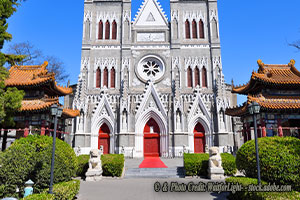
Inside China’s Religious Conflict: Faith Confronted by Politics
The Church in China must yet endure more persecution. The government of Xi Jinping claims to respect religious freedom, but the harassment and indoctrination continue unabated.
The latest manifestation of this true passion is reports that massive photographs of Chinese dictator Xi have replaced crucifixes, pictures of Our Lady and other sacred images indoctrination in China’s “Patriotic” Catholic churches. The missals and lectionaries have been edited to amplify Chinese Communist Party (CCP) doctrines. Banners bear CCP slogans. If the priest is not a committed Communist himself, he knows that his homily must hew to the party line.
Sinicization
As a doctrinaire Communist, Xi would very much prefer destroying the Church outright. However, decades of experience have shown that the underground Church only grows under persecution. The CCP adopted a “second-best” solution by creating a CCP-sponsored Chinese Catholic Patriotic Association (CCPA). The CCPA twists the established doctrines of Holy Mother Church beyond recognition. A word that is jarring to Western ears describes the guiding principle—sinicization.
The Free Dictionary defines Sinicize as “To make Chinese in character or to change or modify by Chinese influence.” The United States Commission on International Religious Freedom (USCIRF) has a slightly more pointed definition; “the complete subordination of religious groups to the CCP’s political agenda and Marxist vision for religion. [It] has become the core driving principle of the government’s management of religious affairs. Sinicization is a political indoctrination process that embeds the CCP and its political ideology into every aspect of religious life, from the religious beliefs themselves to the physical structure of places of worship.”
Under Xi’s leadership, “The goal of sinicization is to turn religious adherents and institutions into perfect vessels of the CCP, root out all perceived non-CCP influences—which the government often disparages as ‘foreign.’”
Twisting Doctrines
Since August 2022, Li Shan, the Archbishop of Beijing, has headed the CCPA. The following quotation may provide insights into Li Shan’s priorities.
“Catholicism tells us that love for one’s country is the fourth Commandment of the Decalogue…Be subject to every human institution, for the Lord’s sake…Supporting the leadership of the Communist Party and fervently loving our socialist motherland is the basic premise for upholding our country’s direction to Sinicize religion.”1
Help Remove Jesus Bath Mat on Amazon
As with all great lies, Li’s interpretation of the Fourth Commandment has a seed of truth, usually expressed as “Honor thy father and thy mother” (Exodus 20:12). The Church’s traditional teachings extend the Commandment to love of country—patriotism.
However, Li distorts this idea beyond recognition. Instead of patriotism being an extension of the honor of one’s parents, Li sees only government authority, which overrules God and everything else. He tears God’s law from its divinely endowed context and twists it to support modern authoritarian Marxism.
Illegitimate Benevolence
Li, it appears, pretends to serve Our Lord while being employed by His enemies. The archbishop is not so much the “shepherd” that Our Lord admonishes his apostles to be, but rather the hired hand who marches the sheep to the slaughter.
Given Xi Jinping’s obvious animosity to Catholicism, Pope Francis’s attitude is curious. Consider these phrases from the Message of His Holiness Pope Francis to the Catholics of China and to the Universal Church, dated September 26, 2018.
Satanic Christ Porn-blasphemy at Walmart — Sign Petition
“I have always looked upon China as a land of great opportunities and the Chinese people as the creators and guardians of an inestimable patrimony of culture and wisdom, refined by resisting adversity and embracing diversity.
Submission Disguised as Reconciliation
“Regrettably, as we know, the recent history of the Catholic Church in China has been marked by deep and painful tensions, hurts and divisions, centered especially on the figure of the bishop as the guardian of the authenticity of the faith and as guarantor of ecclesial communion.”
The Pope then acquiesced to Xi Jinping’s demands.
“I have determined to grant reconciliation to the remaining seven ‘official’ bishops ordained without papal mandate and, having lifted every relevant canonical sanction, to readmit them to full ecclesial communion.”
How Panera’s Socialist Bread Ruined Company
One of the seven was the aforementioned Li Shan.
Continuing Appeasement
Alas, this appeasement is not an isolated case.
On May 21, 2024, the Associated Press reported that “The Vatican made another big overture to China on Tuesday, reaffirming the Catholic Church poses no threat to Beijing’s sovereignty and admitting that Western missionaries had made ‘errors’ in past centuries in their zeal to convert the Chinese faithful.”
These reflections occurred at a meeting of CCPA and Church leaders in Rome. The leader of the Chinese delegation was Bishop Joseph Shen Bin of Shanghai, whom Xi appointed over the Pope’s objections in 2023. The Pope later acquiesced to the appointment.
The Vatican recently agreed to extend its secret agreement with the Chinese Communist government for four more years. This accord allows government officials a role in the selection of bishops. The painful examples given above indicated the orientation of such choices. Such concessions do not end the persecution but only extend it.


